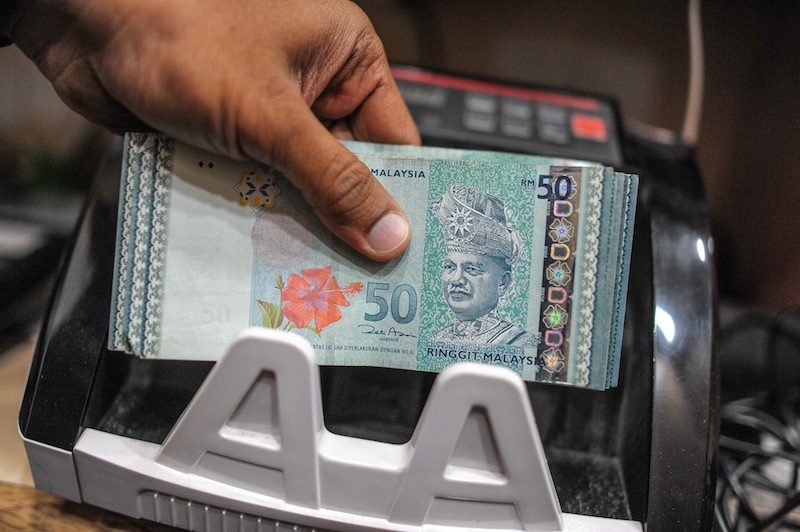“Who to himself is law, no law doth need, offends no law, and is a king indeed” – George Chapman
DEPUTY Finance Minister I Datuk Mohd Shahar Abdullah had recently stated that Malaysia has no intention of legalising cryptocurrency such as bitcoins due to a myriad of circumstances such as price fluctuations.
His statement had come about after the Communications and Multimedia Ministry had put forth the proposal that cryptocurrency ought to be recognised as legal tender.
The debate on cryptocurrency as the future of money was again ignited and had propelled into the international spotlight after Russia invaded Ukraine, raising questions over whether cryptocurrency would be used to circumvent sanctions imposed against Russia by the European Union and Western nations.
From a Malaysian perspective, whether cryptocurrency ought to be recognised as legal tender is for the government to decide on what is best for Malaysia. However, whether cryptocurrency is regarded as legal tender is not cardinal – but instead the government would have to act swiftly to enact and implement specific laws to deal with the rapid growth and use of cryptocurrency globally.
Cryptocurrency is a form of virtual asset that uses cryptography to secure financial transactions.
Essentially, cryptography is a system that consists of complex codes that encrypts transactions and exchange of cryptocurrency. and since these secure protocols are based on avant-garde mathematics and state-of-the-art computer engineering principles, their encrypted transactions are almost impossible to duplicate and counterfeit, and their source of origin almost impossible to unearth.
Today, it has been said the cryptocurrency market is valued at more than US$3 trillion (RM12.8 trillion) where bitcoin alone has a market value of US$743 billion.
However, despite the rapid growth and evolving threat of cryptocurrency to global financial markets and criminal activities, Malaysia does not have a sufficient legal framework in place in terms of regulations and adequate laws to curb, detect and prosecute criminal activities conducted by the use of cryptocurrency.
Therefore, Bank Negara takes the position that digital currencies are not considered legal tender. However, in the same vein, cryptocurrency is not regarded as illegal.
The difference here is that although cryptocurrency is not legal tender, it nevertheless can be used as a payment instrument and transacted between parties.
In the case of Robert Ong Thien Cheng v Luno Pte & Anor 2018, the Shah Alam High Court had held that cryptocurrency is a form of commodity.
In this case, the court was of the view that the word “anything” pursuant to Section 73 of the Contracts Act 1950 includes cryptocurrency and that although it is not regarded as “money” from a conventional perspective, it is nevertheless a form of commodity, such as shares, where money is used to purchase it, and therefore, there is value attached to it.
The court also in its judgment went on to refer to Section 3 of the Capital Markets and Services (Prescription Securities) (Digital Currency and Digital Token) Order 2019 on the definition of a digital currency. An overview of Section 3 reveals a digital currency is regarded as a digital representation of value irrespective of whether it is cryptographically secured or otherwise.
Accordingly, so long as it functions as a medium of exchange for purposes of trade and is interchangeable with money, including the crediting and debiting of accounting ledgers, it is deemed as a digital currency and therefore can be transacted.
Tax evasion and exploitation by criminals
Whether or not cryptocurrency is to be recognised as legal tender is not important but what is foremost is whether Malaysia should have adequate laws regulating the use and transactions involving cryptocurrency. A potential scenario could be as follows.
A Malaysian company obtains a contract to supply goods to a foreign company through an act of corruption. The goods are sourced from outside Malaysia. The payment for the supply of goods is then made to an offshore company.

At this stage, the transaction is shielded from the Malaysian authorities. The Malaysian company then uses the offshore company to purchase cryptocurrency and subsequently uses the cryptocurrency to purchase assets or exchange for cash with use of various cryptocurrency platforms.
The assets purchased in the form of properties or stocks are then registered in nominee companies and are liquidated at a later stage for cash.
The Malaysian company then could repatriate the cash back into Malaysia on the basis of investments or capital which are not subjected to the Income Tax Act 1967.
However, in reality, what I have just described is that the payment for the supply of goods, being income derived by a local company, is actually subjected to tax in Malaysia and constitutes tax evasion which is a scheduled offence listed under the Anti-Money Laundering, Anti-Terrorism and Proceeds from Unlawful Activities Act 2001.
Cryptocurrency is increasingly being abused and exploited by criminals around the world in carrying out their criminal activities such as money laundering, bribery, ransom for kidnapping and terrorism financing.
There are also instances where legitimate trades are conducted by the moving of funds instantaneously across borders, by the use of cryptocurrency for purposes of money laundering and tax evasion.
For instance, in respect of money laundering, the use of cryptocurrency via online exchange platforms for legal or illegal activities are later converted to cash thereby concealing the source of funds and its primary purpose.
Alternatively, illicitly obtained money is used to purchase cryptocurrency which are then used to transact in legal businesses through several exchange platforms thereby creating layers via numerous transactions that ultimately conceal the origins of the money concerned.
This is known as instrumental cyber-laundering and online cyber-laundering, which unfortunately is not covered under any Malaysian law and, in particular, the Anti-Money Laundering, Anti-Terrorism Financing and Proceeds from Unlawful Activities Act 2001.
The goal is to make it practically impossible for law enforcement agencies to detect the origin and destinations of the transactions and this enables criminals to cash out without fear of being identified.
In addition, many online cryptocurrency exchange platforms have no anti-money laundering or ‘“know your customer” (KYC) regulations in place.
With the transition from the physical to the virtual world, cryptocurrency like bitcoins, are potentially capable of severing all links between illicit proceeds and crimes committed as the transaction is based on a decentralised system incompatible with any intervention by any central authority or law enforcement agency.
The challenges faced by investigators and enforcement agencies are manifold which prevent investigations, prosecution and prevention of criminal activities involving or facilitated by cryptocurrency.
Firstly is the issue of geography. Criminals engage in jurisdictional arbitrage as they deliberately perform their operations from lax jurisdictions which are countries with no or very minimal regulations and oversight.
Additionally, in respect of geography, there is the jurisdictional challenge. For example, Malaysia would not have the authority to commence investigations or prosecution since the transactions conducted may not be regarded as a crime in a particular country or the fact that the act was done out of jurisdiction.
Secondly is the issue of anonymity. Cryptocurrencies usually operate on a non-public or private blockchain and their transactions are more opaque.
Thirdly would be the issue of obfuscation where there are a number of mechanisms for helping to disguise and conceal cryptocurrency transactions, such as mixing, tumbling and chain hopping, which makes it more difficult to track and trace the transactions.
When legality is a grey area
Unfortunately, in Malaysia, there are no laws or regulations where operators of these services can be held criminally liable for money laundering and additionally, investigation and any prosecution would be an arduous task as these mixers are able to conceal and disguise the nature, location, the source, the ownership and control of cryptocurrency accounts.
In the absence of specific laws and regulations, it is imperative for now that law enforcement agencies take necessary steps to curb or prevent the misuse of cryptocurrency through regular audits and identifying suspicious transactions.

It is therefore suggested that during the course of any suspected criminal activity, investigators should review the entry and exit points as cryptocurrency is purchased in a variety of ways and therefore, it is essential to begin with the paper trail such bank statements and credit card statements, which would reveal purchases of cryptocurrency.
Then use the blockchain technology, which is the transparent ledger that records the history of the transactions of each coin, to prove ownership of the virtual funds.
On most occasions, contracts would be embedded in digital codes and stored in transparent shared databases which are protected from deletion, tampering and revision.
Therefore, every agreement to purchase would have a digital record and signature that could be identified.
The next step that should be done is to create a profile of the suspected person such as determining if the suspect has experience in trading in cryptocurrency or already has accounts with major trading platforms which would highlight suspicion of putting ill-gotten gains into virtual money.
It is also important that investigators find the necessary devices such computers and phones expeditiously and extract the necessary evidence through forensic analysis which would reveal virtual currency addresses used for payments and details of transactions.
However, there are still challenges that may arise. In this regard, lawyers may challenge the admissibility of evidence obtained, in that whether they were in fact gathered through the adherence of correct legal procedures.
The difficulty faced by law enforcement agencies, therefore, is on what are the prescribed procedures in the absence of specific laws.
There is also the defence of whether the accused person had actually carried out the transactions, in other words the actus reus ingredient would have to be fulfilled.
If the prosecution is unable to establish that the accused was involved or has a beneficial interest in the various transactions with corroborating evidence, then the prosecution’s case would crumble like a deck of cards and the accused would be acquitted.
Another possible defence would be on raising the possibility of unauthorised use of devices to transact thereby raising a reasonable doubt.
In this sense, when it comes to electronic addresses such as the IP and email address used to transact in cryptocurrency, the accused may be able to show that whilst the accused was connected to the device, there is still the possibility that the said electronic addresses were hacked or utilised by third parties to transact without the accused’s knowledge.
Additionally, VPN services allow users to connect to the internet privately and freely without any oversight.
One significant difficulty that arises in prosecuting crimes involving cryptocurrency is the issue of jurisdiction. This is because cryptocurrency transactions have the ability to cross borders and jurisdictions with ease.
Therefore, one possible defence that could be raised is whether the case has been brought with the jurisdiction of the Malaysian courts and also the possibility that the alleged crime may not be classified as criminal activity where the trades took place and its purpose.
It is therefore timely that Malaysia looks into the serious risk and threat that cryptocurrency poses to the economy and generally to the nation as a whole, and to introduce laws to address the swift growth and misuse of cryptocurrency globally.
There can be no wrong if there is no law that criminalises the acts. – The Vibes, April 19, 2022
Datuk Seri Rajan Navaratnam is a prominent senior lawyer and independent legal advisor to The Vibes










.jpg)






.jpg)



